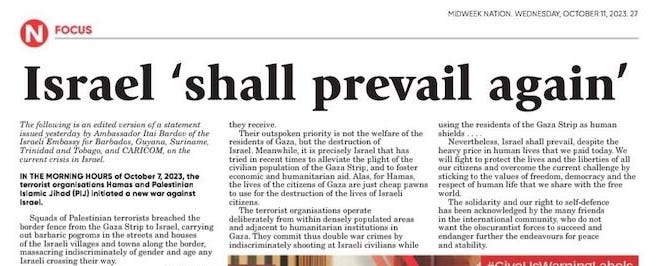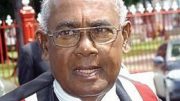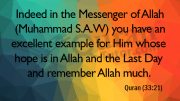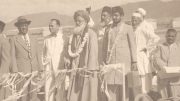“Caribbean people, having endured the brutal legacy of slavery and colonialism, understand the struggle for freedom and the moral imperative of standing with the oppressed against the oppressor.” Suleiman Bulbulia, in a letter to the Editor of the Nation, stated, “It is often said that the first casualty of war is truth, a concept that the Zionist state of Israel has mastered. The headline on page 27 of your Wednesday Nation of October 11, 2023, boldly proclaims, ‘Israel ‘shall prevail again,’ introducing an edited version of the statement by the representative of the Zionist state of Israel to CARICOM.”
There has been and is a war being waged “on Palestinians, from the air, the sea and on the ground, in addition to a misinformation campaign intended to blame the victims for Israel being compelled to kill them.
Mr Bulbulia observed in his letter: “How does Israel achieve this so-called ‘prevail’? For over 75 years, the Zionists have persistently sought to erase all traces of Palestinian lands and its people. Millions of Palestinians now live as refugees scattered across the Middle East and beyond, denied their right to return. Palestinian lands continue to be seized and occupied in defiance of numerous UN Resolutions condemning such actions. Homes, schools, mosques, churches, hospitals, and buildings belonging to Palestinians are systematically destroyed, bulldozed, and blown up. Thousands of Palestinians in Palestine endure and continue to endure a system of apartheid that is both humiliating and brutal, akin to what was witnessed during the darkest days of the mid-Atlantic slave trade and apartheid in South Africa. The routine murder, torture, and abuse of innocent Palestinian men, women, and children by Zionist Israeli forces have sadly become commonplace for over 75 years. That, sadly, is how Israel claims victory.”
Caribbean people must reflect on an important aspect of our shared history of the impact of colonial settler rule on indigenous peoples.
Colonialism, driven by territorial expansion and economic interests, brought profound and enduring changes to the lives of indigenous communities around the world. The consequences of this period continue to reverberate through generations, shaping the social, economic, and cultural landscapes of affected regions.
One of the most significant consequences of colonial settler rule was the displacement and dispossession of indigenous populations from their ancestral lands. Forced removals, land seizures, and restrictive policies often left indigenous communities marginalized and struggling to maintain their traditional ways of life. This loss of land not only disrupted established systems of governance and resource management but also eroded cultural identities deeply tied to specific territories.
Suleiman writes to The NAtion that “The Gaza strip, though smaller in size than Barbados, incarcerates nearly ten times as many people. Gaza, as your editorial rightly pointed out on the same day, is an open-air prison, akin to the Warsaw ghetto of the 1940s but with even greater horror and brutality. The Zionist representative speaks of pogroms, which is eerily reminiscent of what people in Gaza have endured for over two decades. Every aspect of a Palestinian’s life in Gaza, from food and water to energy and travel, is controlled at the whims of the Israelis. Why? In the chilling words of the Israeli Defense Minister, ‘they are animals.’ This is how they treat animals – confine them and exert control as they see fit.
Today, Gaza teeters on the precipice of annihilation. Entire neighbourhoods are bombed, and the entire strip is under siege – no food, no water, nothing. In over 75 years, Israel has committed more war crimes with impunity than any other nation or group. And yet, they seek to cast themselves as champions against terrorism, conveniently absolving themselves of the genocide perpetrated against the Palestinian people.”
The enduring legacy of colonial settler rule can also be seen in the prevalence of systemic inequalities, including unequal access to education, healthcare, and basic services. Indigenous communities have often faced discrimination, limited opportunities, and reduced political representation, further perpetuating cycles of disadvantage. The former Colonialist nations reconstituted themselves as “the Civilized World” and have given a pass to Israel on complying with International Law, turning a blind eye to war crimes.
It is disappointing that any media in the Caribbean would allow such free access to a Colonial Settler nation to its audience without proper framing and placing the statement in proper context.
It is to be noted that The Barbados-based “Caribbean Against Apartheid in Palestine” [CAAP] categorically condemned “all attacks on civilians in all conflicts, and in particular, the continued and consistent genocide of the Palestinian people over the past 75 years by Zionists.
We express our full support for the Palestinian people in their ongoing struggle for the liberation of the Palestinian lands and people from the occupying, dehumanizing forces of the fascist Zionist regime of Israel.
For the past 75 years, the Palestinian people, men, women, and children, have faced collective punishment, degradation, colonization, apartheid, destruction, and death at the hands of the Zionist state of Israel. In the last few days, that collective punishment has increased manifold with the imminent total annihilation of the Palestinians of Gaza, aided and abetted by the hypocritical United States of America and its Western Allies. It is just as wrong to bomb civilian targets in Gaza as it is to bomb civilian targets in Kiev.
What has been witnessed in the last 75 years and what is unfolding now are crimes against humanity; it is genocide. How much more must the Palestinian people endure in the face of relentless oppression and brutality? The Israeli Government has blocked all water, food, energy supplies, and medicines from getting into Gaza. This is Collective Punishment and a Crime Against Humanity.
President Nelson Mandela said, “We know too well that our freedom is incomplete without the freedom of the Palestinian people”. We in the Caribbean, having suffered the legacy of the most brutal and inhumane system of slavery and colonialism, know too well the struggle for freedom and the need to combat such acts of savagery.
No longer can the world continue to ignore the systematic cycle of destruction perpetrated against the Palestinian people and lands by the fascist Zionist regime of Israel.
Mr Lalu Hanuman, Lawyer and Secretary of CAAP, in an invited comment, said: “Gaza 2023 is today’s Warsaw Ghetto 1943. Just as the brave Jewish people herded into the Warsaw Ghetto in 1943 by the fascists fought bac“k against racist oppression, the Gazan people today, herded into the Gaza Ghetto by the fascist Zionists, are fighting back against racist oppression”.
We call for an immediate halt to the genocide of Palestinians and an end to this violence, bloodshed, and racist oppression.” CAAP statement end.
As Muslims, we should know that misinterpretations, half-truths, and outright falsehoods have a tendency to spread rapidly. No one is immune to trials or discord, not even one of the esteemed companions of Prophet Muhammad (saw), Uthman (ra). The pivotal moment arrived when a group of protesters confronted the third Khalifa, demanding Uthman (RA) to either relinquish power, surrender himself for punishment, or face a potentially fatal resistance. Despite his noble stature and virtue, he met his end at the hands of individuals who believed they were acting in the name of justice and righteousness.
Uthman’s (ra) story serves as a poignant reminder of the perilous consequences of misinformation and the need for discernment in our actions. It underscores that our actions are shaped not just by knowledge but by how we utilize it.
The Palestinian narrative often faces manipulation, marginalization, or outright erasure from conversations and media reports. Portraying their struggle as isolated incidents devoid of historical and sociopolitical contexts not only delegitimizes their cause but also jeopardizes their existence. Branding them as ‘terrorists,’ ‘savages,’ or ‘extremists’ becomes a pretext for justifying war.
Our duty lies in responsible consumption and sharing of information. We must exercise caution and discernment, verifying the information we encounter and ensuring its accuracy before dissemination, enabling us to challenge mainstream narratives. It’s about disseminating the truth while preserving our integrity.
In a world inundated with information, where sensationalism often eclipses truth, we must strive to uphold our dedication to truth and accuracy, aligning ourselves with the teachings of our Prophet (saw). Remembering Uthman (ra) serves as a recommitment to this ideal. It’s a summons to uphold truth, even amidst adversity and discord.
As we reflect on this chapter of history, it is essential that we acknowledge the deep and lasting impacts of colonial settler rule on indigenous peoples. By understanding these historical realities, we can work towards a more inclusive, just, and equitable future that respects and uplifts the rights and cultures of all peoples.
Mr Bulbulia ended his letter with a quote from the late 20th-century freedom fighter Nelson Mandela: ‘We know too well that our freedom is incomplete without the freedom of the Palestinian people.’
Despite these historical injustices, indigenous peoples (including Palestinians) have shown incredible resilience and determination in the face of adversity. Efforts to reclaim cultural heritage, revitalize languages, and assert rights to self-determination continue to shape a path toward healing and empowerment.
Rather than furthering the gaslighting of the victims of Colonial Settler legacies, the people of the Caribbean should be adding their voice to that of Moses as he said to Pharoah, “Let My People Go”. Free Palestinians from the tyranny of the colonial settlers and their sponsors.




